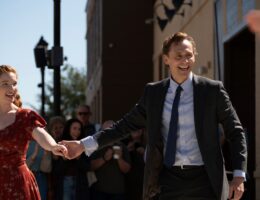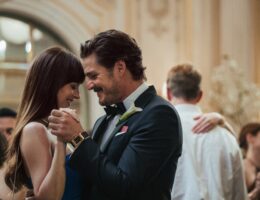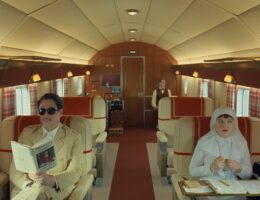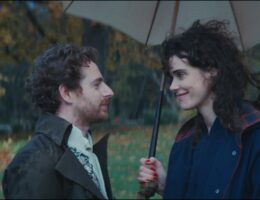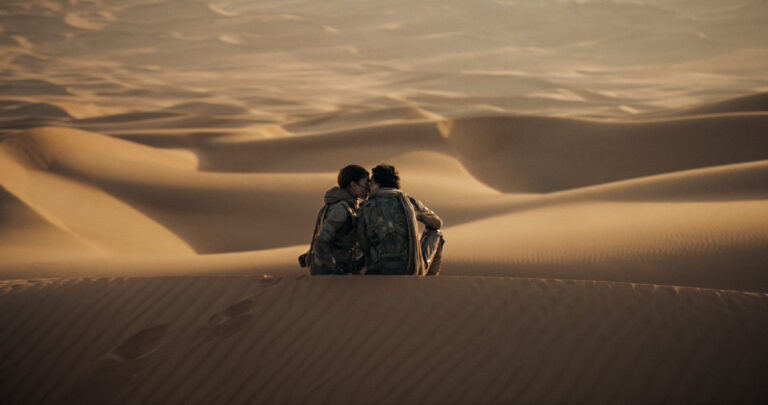Dune: Part Two (2024 | US | 166 mins | Denis Villeneuve)
We start up where Part One left us as Paul (Timothée Chalamet) and Lady Jessica (Rebecca Ferguson) Atreides have found the mistrusting Fremen that they must win over not only to survive but to thrive as both Paul and Jessica have foreseen. Each has their own path in what will become the fight for the freedom of these people and themselves. The latter must manipulate the religious fervor for the coming messiah while the former must lead the people, even if it’s not what he wants for himself.
Meanwhile the supposed heir apparent, Beast Ratha (Dave Baustita) can’t seem to catch a break and finds himself thrwarted time and again. This leaves an opening for his equally (if not more) abominable brother Feyd-Rautha (Austin Butler). With an ominous presence of the head-to-toe hairless snow-white skin of the Harkonnens, Feyd is not only barbaric but lethally smart unlike his beefy brother and proves to be infuriatingly resilient. He clashes with Paul at the pinnacle of this story to set off events that will begin the battle for survival.
First and foremost, it’s pretty important that you watch Dune Part One if you have plans to watch Part Two. There are those that feel like any film should be stand-alone, but honestly we all knew this film was planned to be a two part epic that attempted to touch every plot point, every character and every nuance of Frank Herbert’s story. Even after watching both parts, I can say with certainty this is impossible. Being a fan of the first book (I’m iffy on the rest) this is a true test of whether a movie can capture everything a book portrays from beginning to end. If five hours of footage attempting to capture one book of 489 pages can’t offer a complete picture, then nothing can… and it definitely fell a bit short. However, in the first film I was worried that the relationship between Paul and Chani (Zendaya) would dominate the story line making it “watchable” for a wider audience, thankfully they pulled it together and made her a strong character all on her own and honestly she shone brightest in this second installment.
That being said, just as the first entry of this saga offered, the second part filled the immensely large screen (which is a must, if at all possible, to view this film for the first time) with gorgeous, sweeping, sand-filled visuals. It’s as if National Geographic decided to make a movie about the Al Khatim desert (where a majority of these scenes were filmed), you just can’t create that kind of beauty in a studio and I’m glad they didn’t try.
It’s fair to say that we were both high on the spice of Dune: Part Two. Below, Josh and I had a bit of discussion on the finer points of the film.
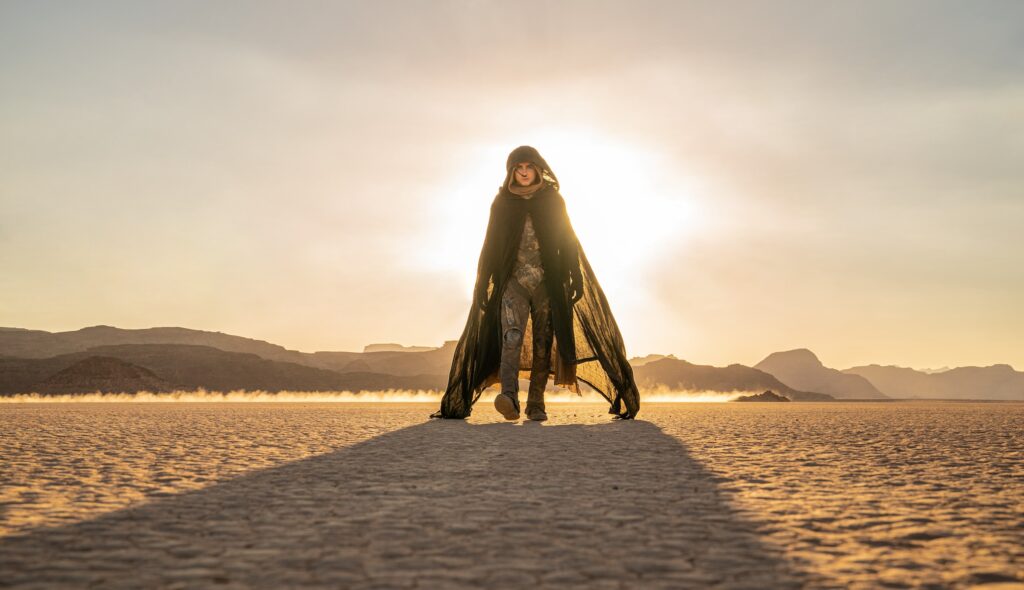
Morgen: If you like blockbusters, there is no doubt you will enjoy Dune Part Two, period. If you’re there simply for that reason, more power to you and just make sure you either sit at the end of the aisle for a potty break or keep the drinking to a minimum. While you may be enthralled by the visuals and storyline, your bladder won’t care.
Josh: I think your appraisal is right on. This is a breathtakingly well-constructed blockbuster that operates at immense scale. I saw it at the Pacific Science Center’s IMAX and just reveling in the sights and sounds of it was a phenomenal experience. Villeneuve is a master of images and, accordingly, that’s where the film rises and falls. Every frame is stunning to look at it, the action is masterfully staged, and the sound design is immersive. The downside of all this grandeur is that it can leave the personalities feeling slim in comparison, even moreso in what’s a pretty stilted space opera.
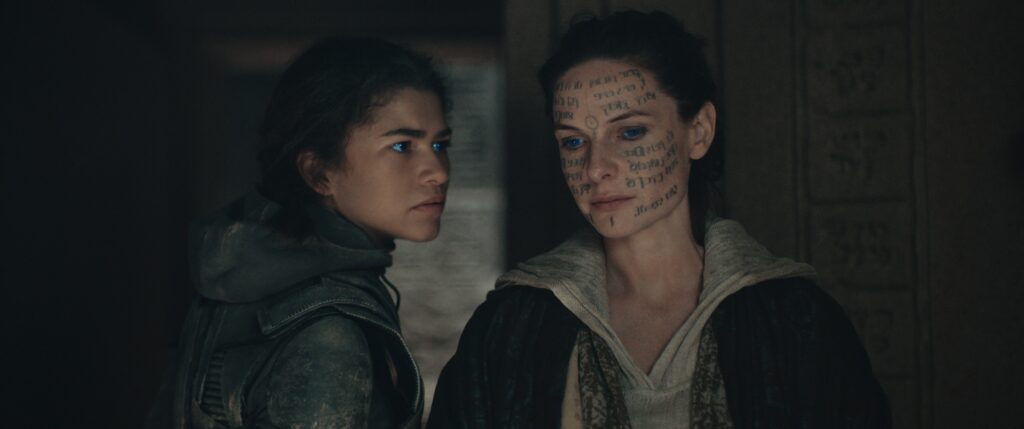
First off, do you think a film should stand on its own and not rely on a previous (or future) film to make sense?
Morgen: I think if it’s a first in a series of films, yes. It shouldn’t rely on possible future sequels to make it seem complete (e.g., Madame Web, she’s just dying for a couple spin offs, a sequel and a crossover with Spider-man… ugh). However, we all knew that the first film and this follow up were meant to be part of a whole. I felt like the first film did work on its own and even if the money ran out or the stars dropped out, it would have been an enjoyable film. This second one kind of started in the middle and didn’t have any flashbacks to remind you of what happened. It was almost like they filmed the five-hour epic and just cut it in half. I’m not a huge fan of that, but I get it… they had to make tough choices in the editing room… boy did they ever.
Josh: I remember people being a bit miffed at the Dune premieres in Venice at Toronto when the “PART ONE” made a surprise appearance under the main title. The hotly-anticipated project had been shrouded in secrecy, so the revelation that it was only half the story came as news to some. Still, I agree: Part One worked great for me. It’s so reliant on prophesy and visions that even in its abrupt conclusion, audiences like me (who haven’t read the Herbert novel) had a pretty clear sense of the arc that it would follow. I also felt like there was near-certainty that there would be a Part Two, so I wasn’t too worried about finding out what happened next. Now having seen both parts, I applaud Villeneuve for his choice of where to make the cuts between Parts One and Two. It left us wanting more and fulfilled on that promise — the world of the Fremen is better explored, the perspective on the rest of the galaxy widens, and it outdoes the first installment in scale. I could see someone watching them back to back (with an intermission) and having a cohesive experience.
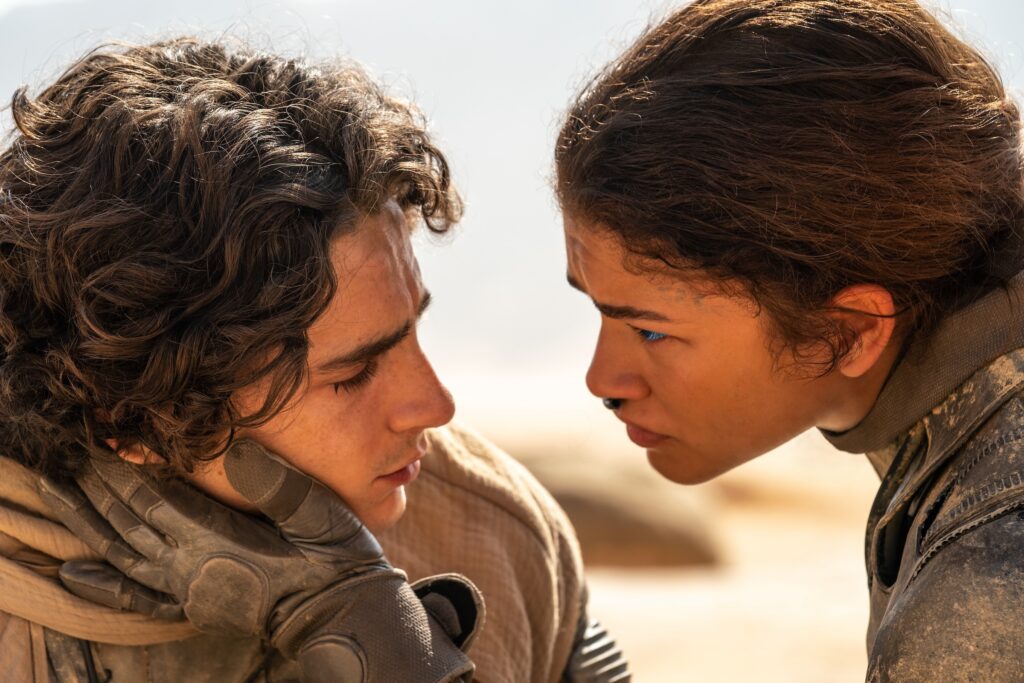
As far as actors/characters go, who really stood out for you?
Morgen: First, Zendaya’s Chani was the strong female character that I had been so hoping for. She had trust, which was a rarity for her, in Paul and helped him become the person he was meant to be without sacrificing her own internal ethics and beliefs. Even when she was tested by Paul’s rise to power she remained who she was and Zendaya played this perfectly.
Josh: I agree, Chani is essential and without Zendaya’s skeptical take on the character, I don’t think the movie works at all. If anything my main issue with the film — which I really did enjoy — is that it’s a story of a thousand-year conspiracy coming to fruition. With such grand stakes, it’s essential to have at least one doubter to put these distant machinations in context; so seeing Chani fall for Paul while remaining deeply troubled by the path he can’t seem to avoid following is a key reminder that this is a universe where actions have dire consequences on ordinary people.
Morgen: Austin Butler also crashed onto the screen as Feyd-Ratha and I couldn’t have asked for a better baddie than this. His ruthlessness and keen intelligence (at least for killing) shone through in the sadly short screen time he was offered. While we didn’t get much back story on this character, Butler brought him to life and gave nuance to the evil that bubbled just below the surface.
Josh: Whether they like it or not, most of the key characters are archetypes being moved around a galactic chess board by the careful plotting of generations of space witches. That kind of story makes for a lot of true believers and not a lot of nuance. Rebecca Ferguson is always a high-wire delight, so her descent (or maybe ascent) into prophetic fervor is fun to watch even if it rightfully feels like it’s broken free of gravity (I did not expect so much developmental biology in a space movie). As a counterpoint, there’s almost a tragic humor in Javier Bardem’s Stilgar as the truest believer in all of the traps that the Bene Geserit have laid to pave the way for their messiah. Which brings us to the desert mouse himself: Paul, who Timothée Chalamet plays as a mystery seemingly even to himself. Swept up against his will in the impossibly strong tides of magic, religion, and political plotting, this still maturing, confused, and conflicted young Duke has to be the toughest role. Chalamet is good enough, and surprisingly adept when called to some gritty action choreography. His Paul remains something of a cipher, we understand his resistance to being cast as a Messiah, but there’s not much room amid the bombast to get a sense of his inner conflict.
I’d say the same about almost the entire cast. Butler is chilling but one dimensional, although I’m thrilled that he finally shook that Elvis accent (albeit for a dead-on Skarsgård impression). Florence Pugh is intriguing, though again has very little time to establish herself as a character with motivations beyond the role prescribed to her by generations of all-seeing schemers. There are a ton of other great cameos, some weirder than the next, but all quite a bit of fun.
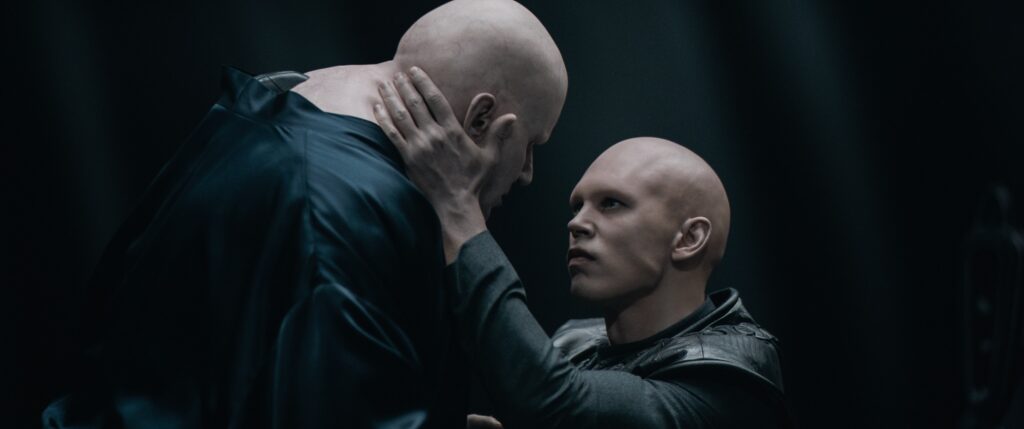
Do you feel like they created the world with enough detail to give you context why the Fremen, Atreides and Harkonnens are the way they are?
Morgen: While the first film hinted at the fact that this was an interworld storyline, the only thing that told us as much was the travel from Caladan (the Atreides family home world) to Arrakis. While the first book is mainly about the governing of a people on a single planet and the fight for a rare “product”, the fact that the government isn’t even on the planet has a profound effect on the storyline and how insignificant the Fremen really are to those in power. I think I might be getting in the weeds here, but this is just one good example of the world building opportunities they could have included with just a few lines.
Josh: I have to confess the harder sci-fi mechanics of this world made no sense to me whatsoever. Why the Emperor would outsource production of the galaxy’s most essential product at all — let alone to unreliable warring families just to bring them each down a peg — seems like a huge unforced error! If there were only one planet with this incredible spice, I might have locked the whole place down and maintained complete control with my own best people rather than having other Houses pack up their whole planet to run it for a few months.
By the end, I got a vague sense of the scheme, but I was generally able to just make like a sandworm, power through the murk, and enjoy the movie by letting what felt like major missing details roll by.
Speaking of the sandworms, I do have some major questions about how they work as a form of desert mass transit! In Part One they’re a terrifying menace. In Part Two they’re somewhere between the cat bus from My Neighbor Totoro and giant living war machines. There has to be a story there, maybe it’ll be covered in a prequel mini-series.
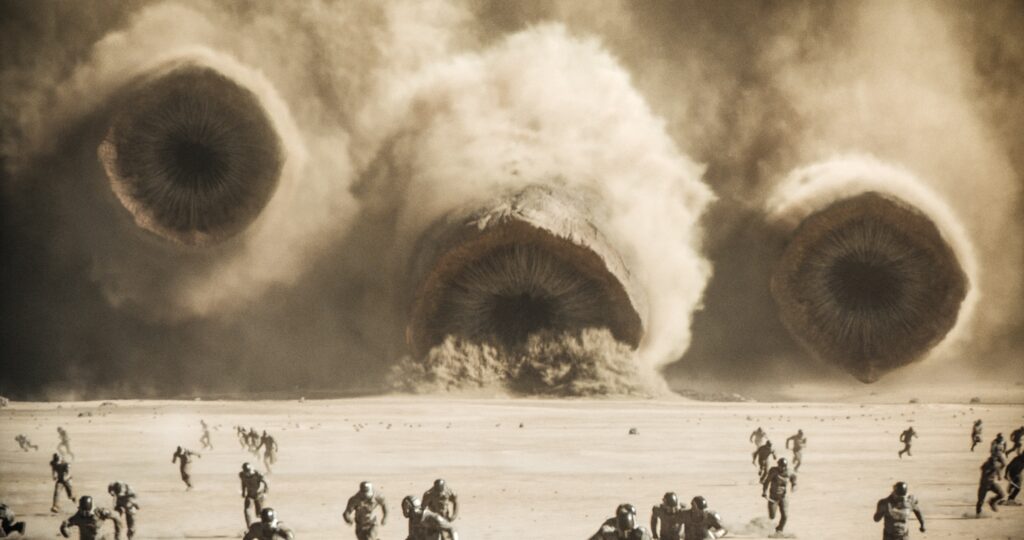
As a follow up, did we understand the relationship between those three groups within the larger context of the world Frank Herbert built? Did we understand that this was actually a story about star travel and the complex nature of government (but set in an interesting context)?
Morgen: While it was set up to a point in the first film, the tension between the Harkonnen and Atreides especially was woefully overlooked. Why did Feyd-Ratha even care so much in the second film about destroying the remaining Atreides family member… the Harkonnens had heard the stories of the Kwitsatz Haderach from the Bene Gesserit, they didn’t know he was the fabled messiah. Also, if you feel a little lost in my responses, once again this is where the small bits of info could have been peppered in to broaden the scope and understanding of the Dune storyline.
Josh: As great as it is to get caught up in the spectacle, I felt the nagging sense that a whole lot of something was omitted in terms of context. Again, Villeneuve relies on the terrifying look of the Harkonnens with their brutal black & white world, creepy hairless bodies, and constant cruelty to communicate the basic characteristics of power-hungry thugs with a vendetta. He also relies on the assumed familiarity of the Atreides, with their verdant green world, to endear them as the most “like us” (clearly writing for a white, northern hemisphere audience) and the harshness of the desert (complete with all of those stereotypes) to set our allegiances and other-ness. It’s a leap you have to take, but it sure comes with a lot of baggage.
It was interesting to get some hints of the broader plans and back-up of the Bene Geserit, but it often seemed like their schemes were so deep in the shadows that no one — sometimes not even each other — was aware of the prophesies that they’d laid to manipulate the galaxy!
Morgen: I gotta say Josh, considering you’ve never read the novel you hit on some very key points about the storyline that is hard for me to recognize since I have the burden of knowledge. Yes, we are definitely missing something when it comes to the nuance of governance and why spice is so important. I don’t think it’s giving anything away to say that spice is essential to space travel. There are special “astronauts” that use spice to see through time and space and allow for them to arrive at a destination in split seconds that would have taken many light years. From that you can gather why the one planet in the known universe that creates it would be priceless. That’s a huge missing plot point that should have been emphasized. The Harkonnens want their piece of this enormously valuable pie and will do anything to get it, but the emperor has final say in who has control over any given world. Because of this, he is the most powerful man in the solar system… but you saw how Paul dealt with this power suck and satisfyingly put him in his place (while gaining the hand of a princess in the process).
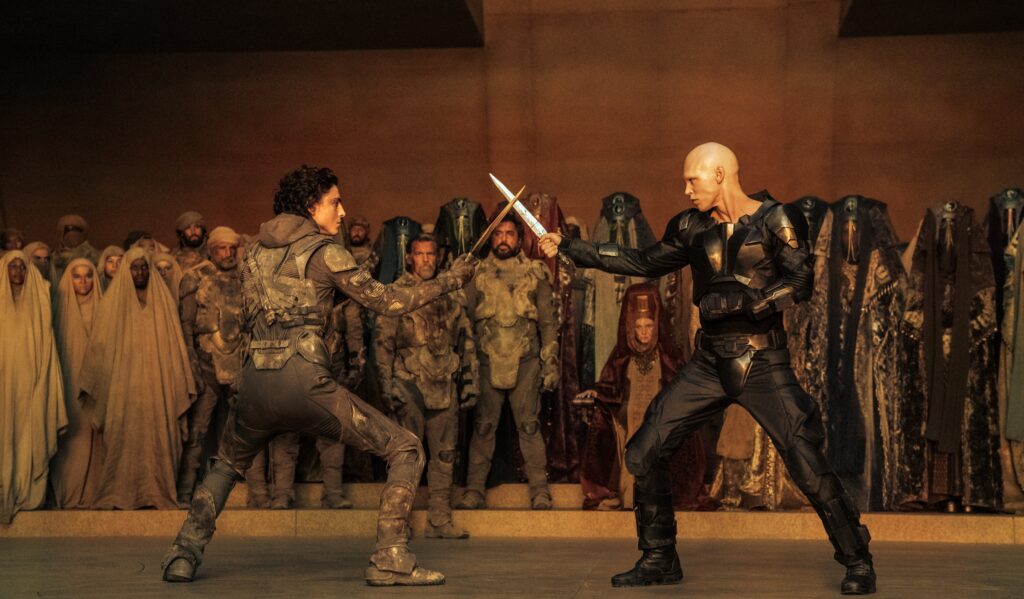
While highly anticipated and expansive stories like this are now expected to be two and half hours long (or more) do you feel like they could have been more conservative with the editing? Did it have to be two hours and forty six minutes long?
Morgen: Having read the book along with the newer prequels (if you’re a fan of the book series, I highly recommend checking these out, I loved them almost more than the original book. The depth they go into the characters you love is magnificent.) I am particularly interested in the full depth of the world and story that Herbert created. Even with the longer run time, it still left out several aspects of character building that I would have liked to see. The treachery of those close to the Atreides, the relationship between Leto and Jessica, the history between the Atreides and Harkonnens, etc. These are things portrayed in the acting, direction and nuances of the script. I’d argue some of these aspects fell through the cracks and wouldn’t have taken much more time, if any at all, to portray. So yes and no, I think they could have been a little more diligent about editing, but I wasn’t bothered by the long run time.
Josh: I have to say that there was so much to enjoy here, even with my reservations about the shallowness of the plot and occasional groans at some of the stilted dialogue (which I assume are lifted right from the book) that the hours flew by. I’m intrigued by your perspective on the depth of the novels vs. what was accommodated in the movies. Yet as much as I’d like to know more, I can’t argue with what Villeneuve put on screen.
The pacing was terrific, starting a bit slow to reacquaint us with the rhythms of life in the desert, picking up steam through each very thrilling setpieces, and racing to a satisfying crescendo of a conclusion. I was never bored, often curious, and was almost a shocked when I realized the the grand conclusion was upon us. The film leaves us on an appropriately darkly contemplative ending, not quite a cliffhanger, but a sense of another grand galactic mess sprawling out ahead. Whenever they get around to tackling the next phase of the story, I’ll definitely be there to see it!
Dune: Part Two opens in wide release on March 1.
Images courtesy Warner Bros.
